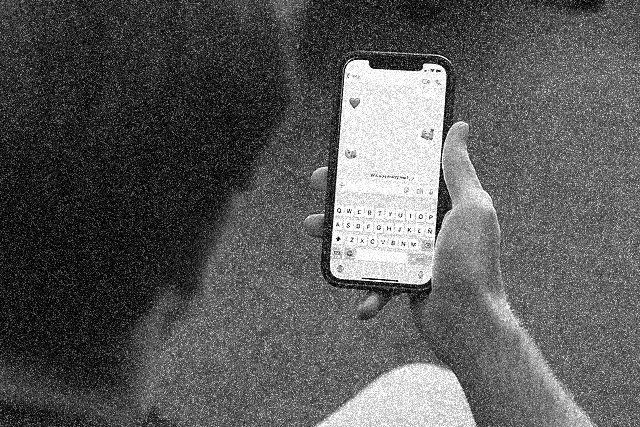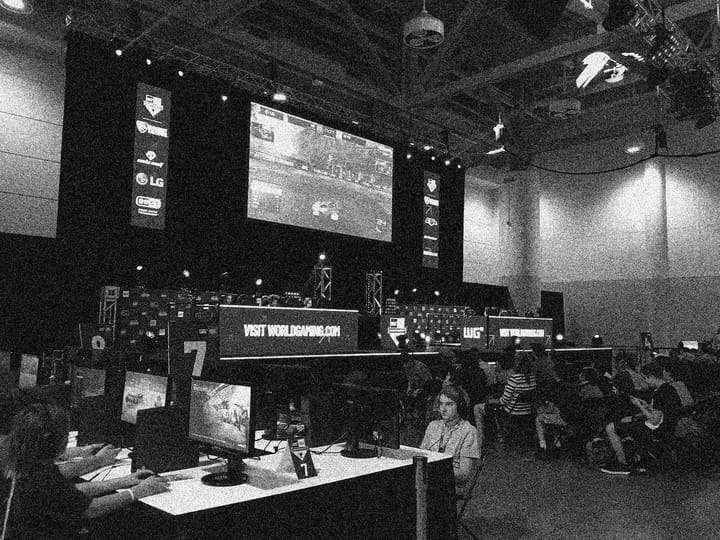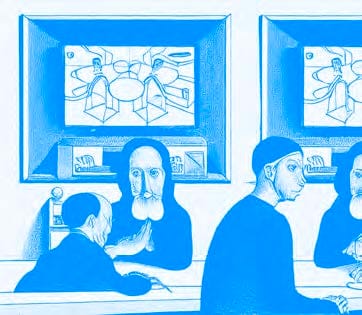Abolish Tinder
We don’t need socialized dating apps. We need to eliminate the social conditions that make them useful.

For many of us fortunate enough to be able to work from home but unfortunate enough to be single in March 2020, the pandemic brought crushing isolation. We were trapped in our homes, while opportunities to meet romantic prospects in the outside world vanished. The only possibility for the faint of resolve were dating apps, and they were more than happy to welcome us in. Along with Zoom and porn, dating app activity surged to record levels.
But using them to find some kind of happiness beyond the serotonin jolt of a new virtual match was elusive. Meeting face to face now took on new risks which had to be weighed before committing to a date. We always knew that the apps had an interest in keeping us on their platforms for longer, hopeful but dissatisfied, to sell us ads or get us to pay for an upgrade. But during the pandemic, the dating apps attempted to colonize formerly app-free aspects of dating. Previously you’d be able to escape to meat-space once you exchanged a few lines of conversation and got someone’s number, but no longer. Instead, a phone icon appeared where you could have a video-call first date with your match within the safe bounds of the platform. (We can only imagine what the introduction of VR technology will do to this mediating factor).
In a recent Jacobin article, Nick French tries to offer a better way. He begins by pointing out that the interests of dating app users (“finding love”) and the interests of app makers (turning a profit) are ultimately misaligned. A fair point, true of just about every commodity under capitalism. But this is not yet reason to abandon them: for him, “Dating apps are an increasingly important avenue for a central experience of being human.” French does not propose nationalizing dating apps but rather the creation of “online dating co-ops, in which users and workers would collectively own and control their platforms”—a state-funded alternative to the bad, privately-owned dating apps. This good dating app would not harvest our data for profit and would give us all the upgrades for free. Here’s how it would work:
Each user-owner could pay a subscription fee to fund the app and pay its employees; users and developers could democratically decide how high to set the subscription fee, with the goal being not to maximize profits but to raise enough revenue to invest in creating the best possible dating experience.
Let’s go ahead and bracket the sad fact that socialists are spending their time reimagining dating apps (or writing critiques of those imaginations) rather than picking up prospects in real life. The basic problem with French’s argument is that it puts the chariot of love before the horse.
In this society, it seems pretty unlikely that the cooperative dating app model would take off any more than the cooperative social media site. The whole point of being on dating apps is to expand your horizons, not to limit them to a small group of self-selecting users. Cooperatives in a capitalist society must face intense market pressures, and those pressures typically place severe limits on their scalability. They also make even their basic viability a question, and the solution in this case would likely either mean high user costs or slowly caving to market pressures. Either way, while I would, as a good leftist, certainly try out the co-op experience, I would naturally revert to Tinder, for the same reason that I use Uber and DoorDash. They are rational choices in a completely irrational society.
But perhaps French is imagining a socialist government with money to throw at social problems. We’re not talking about a cute experiment that, with any potential for appeal beyond a tiny subculture, would inevitably be swallowed by the market. We’re talking about a real investment, meant to endure and be in the interest of the vast majority of (single) humanity.
But in this world where we actually had the power to nationalize or socialize these mammoth companies, and create a state-subsided worker-owned dating app, we might soon find that the conditions which made dating apps an acceptable compromise have changed. It might turn out that we have different priorities and that we might want something different entirely. In such a society, I’d wager, we’d be better served just abandoning the apps completely and finding new ways to meet in real life. The way to get to better romance is not better, democratically governed dating apps, but a world in which dating apps are unnecessary.
Something else
Forging an intimate connection with another person will always be challenging, even under socialism. But the society we find ourselves in today makes the process particularly fraught. The basic problem with Tinder, Hinge, OkCupid, etc., is not, as French argues, the conflict of interest between money-making and love-finding. Rather it is the conflict between expansive human desire butting up against the limits of deeply constrained reality.
As in so many other areas of society, the pandemic did not so much transform as rapidly accelerate trends that were very much underway before. Sex and romance in the 21st century United States were already taking ever more circutious forms. An Atlantic article from 2018 proclaimed a “sex recession,” attributed to the increasing availability of porn and a focus on careerism, amongst other factors. For those still willing to give it a go, new strategies have emerged for sifting through a large pool of applicants on the dating market, both adding to the alienation while offering ways of overcoming it.
These strategies, whatever their actual worth in dating, are at root attempts to grapple with the atomization of the neoliberal period. Robert Putnam’s Bowling Alone, first published in the 90’s, charted the withering of in-person collective gatherings in favor of more isolating experiences. The internet’s simulation of socialization on two-way channels of social media (in this case, dating apps) is still part of this trend, though now our experience of isolation can be encased in a virtual sociability.
French’s argument, like other left-wing arguments in favor of certain technologies, does not account for this long-term decline of communal life and the crushing atomization it has engendered. Like French’s article, the general line of the digital socializer is to acknowledge how central these services have become to contemporary life and how there are some good aspects, point out all the ways that online platforms are nonetheless toxic and exploitative, and then advocate for some version of state or community governance to solve the problem. In the case of Facebook, one argument goes, we ought to treat it like a public good, and nationalize it. But are social-media platforms actually a public good? Or are they an asocial excrescence, filling in the gaps of what capitalism has destroyed?
As discussed in other Damage articles, the basic issue here is that French’s argument does not question the actual sociality of online spaces. Why is this thing to be socialized rather than abolished? The abolitionist argument is simple: Social media environments produce horrible versions of ourselves. We might be able to fix some of it with democratic accountability. But the problem is with the underlying society, which limits us to such emaciated ways of relating to each other. We want a world in which the underlying factors pushing us on to these platforms are no longer present.
On to the next one
French repeatedly uses the term “dating experience,” to describe his object. The term serves to capture a formerly real-life phenomenon as a discrete, commodified object—a sick, if all too familiar feature of the hypercapitalist “experience economy” we are currently subject to. But I don’t want to have a commodified dating experience at all, whether or not I am its partial co-owner. I do not want the separation of my desires to be objectified and laid in front of me. That work is between me and my analyst, not a democratically controlled team of software engineers.
In the book Labor of Love, Moira Weigel recounts how dating itself is a capitalist invention that emerged at the beginning of the 20th century as men and women moved from the family-bound farms and small towns to the cities, where there were anonymous spaces and little community oversight. This form of dating could be seen as an improvement on arranged marriages, but also suffers in being a reflection of capitalist job markets. Today both partners must work to earn enough to support a family, causing lovers to pick members of their class and stick with it. Even in a more equal relationship, our roles as wage-earners stamp romance with unfreedom.
As Kristen Ghodsee and Julia Mead argue, women had better sex under socialism—not because the state or a co-op forced men to behave better, but because everyone, women included, had more free time, buttressed by free healthcare, affordable housing, and job security. These kinds of public goods are the foundation of better human interactions of all kinds.
We should not imagine democratic state-funded dating apps to be any kind of solution to our problems. A better role for the state in supporting positive, vibrant romantic lives is to provide stable healthcare, housing, food, jobs, followed by funding for the arts, civic clubs, and public recreation spaces of all kinds. We should have more opportunities to be part of bowling leagues, reading groups, and knitting clubs.
Instead of advocating state-controlled matchmaking, let’s advocate for real freedom—a society that has more time, less rules, and more opportunities for people to be together. Once we open up space to be together, new ways of relating will follow.
■
Matte Silver is a dullish gray with a tinge of blue.



